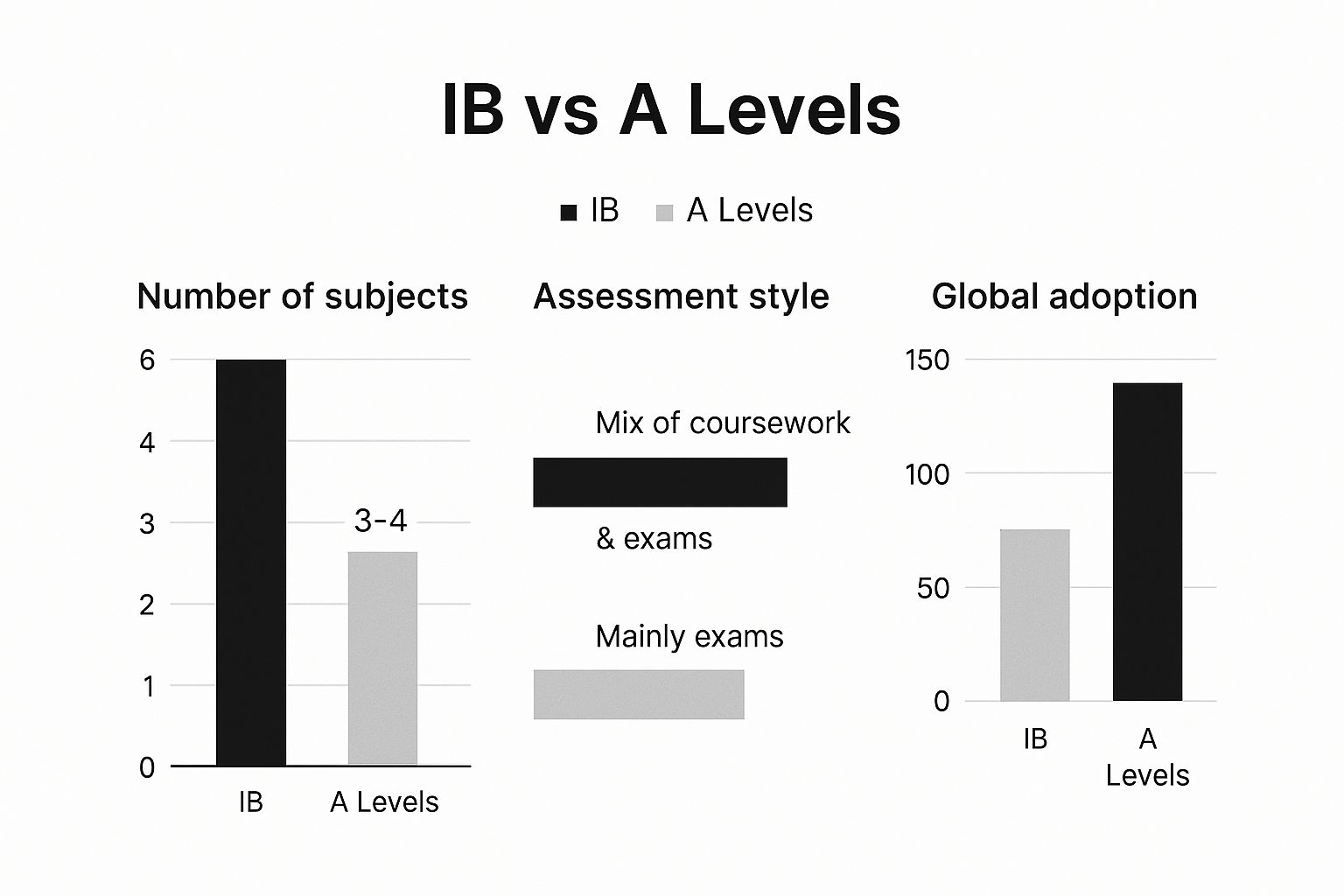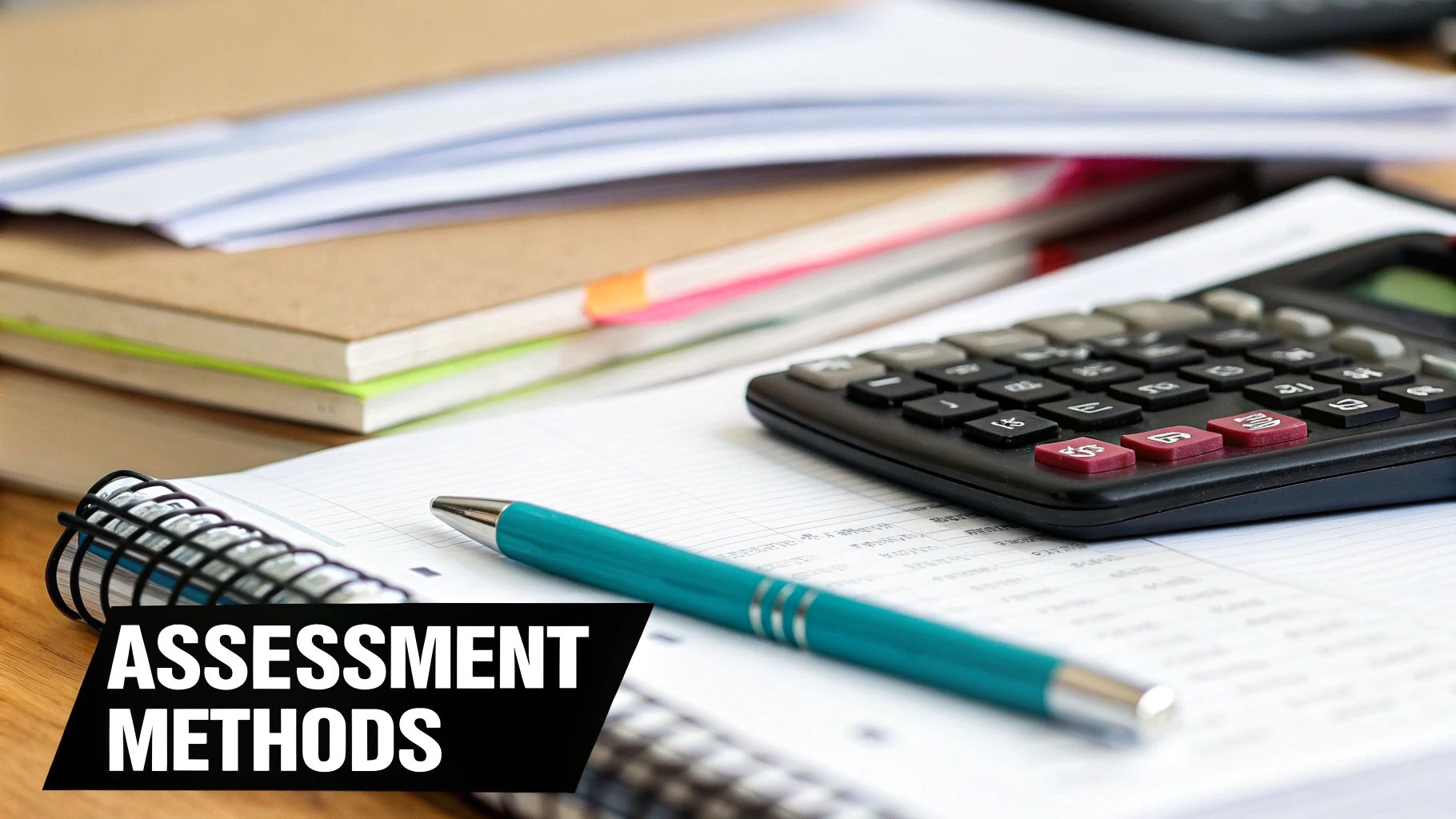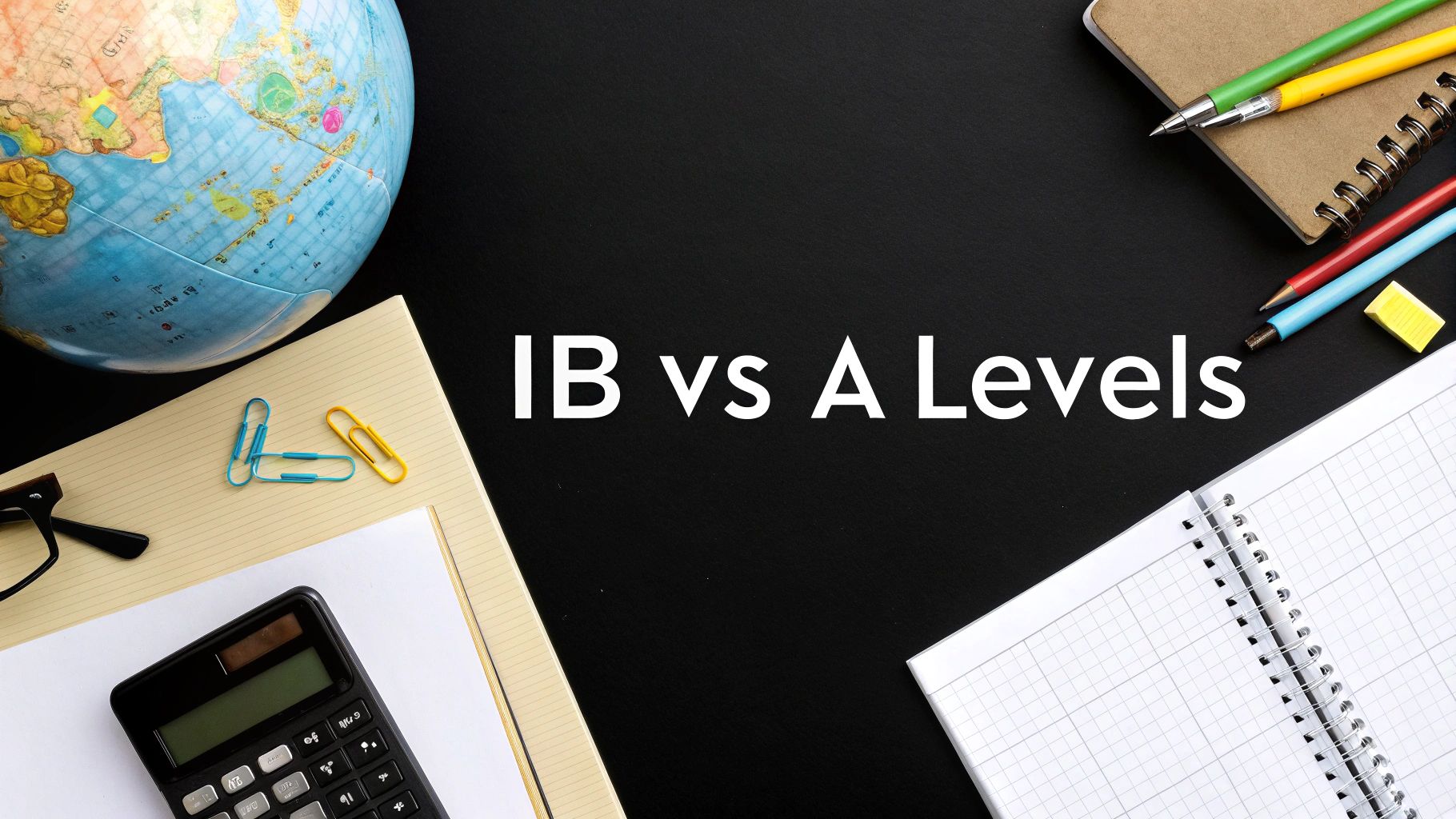Choosing between the International Baccalaureate (IB) and A Levels isn't just an academic decision; it's a deeply personal one about who your child is and how they find joy in learning. The core difference is simple but profound: the IB champions intellectual breadth with a global outlook, while A Levels are all about focused depth and specialisation.
The right choice depends entirely on whether your child’s heart soars when they explore connections across many subjects, or when they dive deep into the few they truly love. This guide is about helping you see that choice through their eyes.
Choosing Your Child's Path: A Quick Comparison
Watching your child approach their final years of school can feel like standing at a major crossroads. The path they choose now—whether it’s the International Baccalaureate (IB) or A Levels—feels monumental because, in many ways, it is. This isn't just about qualifications; it's about nurturing their confidence, honouring their unique learning style, and setting them up for a future they can be genuinely excited about.
Think of this initial comparison as the first step in a thoughtful conversation with your child. It’s a chance to discuss their dreams, their anxieties, and how they see themselves growing over the next two years. The goal is to find the environment where they won’t just succeed on paper, but truly flourish as an individual, feeling understood and supported every step of the way.
IB Diploma vs A Levels At a Glance
So, what are the fundamental differences? This table cuts straight to the chase, breaking down how the two programmes are structured so you can start to imagine your child in each setting.
| Aspect | International Baccalaureate (IB) | A Levels |
|---|---|---|
| Structure | A broad, holistic framework requiring six subjects from different discipline groups, plus three core components. | A specialised programme where students typically focus intensely on three or four chosen subjects. |
| Subject Choice | Students must study a language, a science, mathematics, humanities, and an arts subject (or a second science/humanity). | Students have almost complete freedom to combine any subjects they wish, allowing for deep specialisation based on their passion. |
| Ideal Student | Best for the curious all-rounder who feels alive when making connections between different fields and wants to keep their future open. | Perfect for the student who has a clear passion or career path in mind and finds joy in dedicating their energy to mastering it. |
As you can see, the two qualifications cater to very different types of learners and thinkers. One isn't inherently "better" than the other, but one will almost certainly feel like a more nurturing and empowering fit for your child.

This visual really highlights the contrast. The IB's structure, with its mandatory subject groups and mixed assessment styles, stands in sharp relief against the focused, exam-heavy model of A Levels.
Comparing Educational Philosophies

Choosing between the International Baccalaureate and A-Levels goes far deeper than just picking subjects. It's about finding the educational philosophy that clicks with your child. Each programme is built on a distinct belief about what education should achieve, shaping not only what they learn but how they learn to think and feel about the world.
This decision is deeply personal and emotional. It centres on which approach will genuinely ignite their curiosity, build their confidence, and prepare them for the world in a way that feels right for them.
The IB Diploma is founded on a philosophy of intellectual breadth and interconnectedness. It’s designed to shape inquisitive, well-rounded global citizens who see that knowledge isn’t meant to be kept in neat little boxes. Imagine a student learning about climate change: in Biology, they study the science; in Economics, the financial impact; and in Literature, they read novels about its human cost. This is a model that constantly asks students to question, connect ideas, and reflect on their learning.
On the other hand, the A-Level philosophy champions depth and specialisation. It operates on the principle that true mastery and confidence come from immersing yourself deeply in a few chosen fields. This pathway empowers students to build a profound knowledge base, preparing them for highly focused university courses and specific careers. It’s a system designed for the child who has found their passion and wants to chase it with singular, joyful focus.
The IB: A Philosophy of Holistic Inquiry
The heart of the IB isn’t just in its subjects, but in its three mandatory core components. These aren't just add-ons; they are the engine of the programme, designed to cultivate skills that stretch far beyond academic knowledge and touch upon who they are as a person.
- Theory of Knowledge (TOK): This is where students step back and explore the very nature of knowledge itself. For a teenager figuring out their place in the world, asking "How do we know what we claim to know?" can be transformative. They analyse how their own experiences and culture shape their understanding, building empathy and critical thinking.
- The Extended Essay (EE): Every IB student undertakes a 4,000-word independent research project on a topic they genuinely care about. It's a proper dive into academic inquiry, teaching them how to frame a research question, gather evidence, and build a coherent argument—skills that are indispensable for university and build immense self-reliance.
- Creativity, Activity, Service (CAS): This component gets students out from behind their desks and into the world. Imagine your child organising a community fundraiser (Service), learning a new instrument (Creativity), or joining a sports team (Activity). CAS ensures their personal and social growth is just as important as their academic work, building resilience and a sense of purpose.
The core idea behind the IB is that an education should develop the whole person. It’s not just about passing exams, but about nurturing a lifelong curiosity and a sense of responsibility to the world around them.
Let’s think about a student, Sarah. She’s passionate about human rights but also loves science. The IB allows her to study both History and Biology at a Higher Level, letting her explore the historical context of global health crises. Her Extended Essay might analyse the effectiveness of an NGO's health campaign, while her CAS project could involve volunteering at a local refugee support centre. For Sarah, the IB’s philosophy allows her to weave her diverse interests into a single, meaningful educational journey that feels true to her values.
A-Levels: A Philosophy of Focused Mastery
The A-Level philosophy is all about empowerment through focus. It recognises that by age 16, many students have a clear sense of what drives them. This system gives them the freedom to drop the subjects that don't align with their goals and go all-in on the ones that do, which can be an incredible relief.
This approach is incredibly powerful for students with a clear ambition. The specialisation isn't a limitation; it’s a strength. It allows them to build a highly competitive profile for university courses that demand specific, high-level knowledge from day one.
Consider Ben, who has dreamed of becoming a software engineer since he was young. The A-Level philosophy is a perfect fit. He can channel all his energy into studying:
- Mathematics
- Further Mathematics
- Physics
- Computer Science
This combination gives him an exceptionally strong foundation, preparing him to tackle complex problems and develop advanced skills long before university. He isn’t required to write essays on literature or study a language he won’t use; every ounce of his effort is directed at the subjects that spark his excitement.
For a child like Ben, the A-Level pathway doesn't feel restrictive—it feels like a launchpad. It honours his passion and gives him the tools to excel, building his confidence through deep and genuine subject mastery.
Analysing Curriculum and Subject Choices

This is where the theoretical debate of international baccalaureate vs a levels gets real. It’s the point where you start picturing your child’s weekly timetable, the books on their desk, and the ideas they'll be wrestling with every day. Getting to grips with how each curriculum is structured is the key to knowing which path will genuinely light a fire in them and keep them motivated for two crucial years.
The two systems come at subject choice from completely different philosophies. One offers a balanced, structured menu designed to give a broad education, while the other is more of an à la carte experience, allowing students to specialise deeply. Neither is inherently better, but one will almost certainly feel like a more natural and less stressful fit for your child.
The IB Diploma: A Structure for Balanced Exploration
The IB Diploma Programme is built around a non-negotiable framework that ensures every student gets a well-rounded education. This isn't about shoehorning them into subjects they hate; it's about encouraging them to see connections across different disciplines and view the world through multiple lenses.
Your child will need to select one subject from each of the six academic groups, guaranteeing a blend of arts, sciences, languages, and humanities. This structure is designed to prevent premature specialisation, which can be a huge comfort for a student who isn't ready to close any doors.
The six groups are:
- Group 1: Studies in Language and Literature
- Group 2: Language Acquisition
- Group 3: Individuals and Societies (like History or Economics)
- Group 4: Sciences (like Biology or Physics)
- Group 5: Mathematics
- Group 6: The Arts (like Visual Arts or Music) or another subject from groups 1-4
Within this framework, students pick three subjects to study at Higher Level (HL) and three at Standard Level (SL). The HL subjects are where they can really dig deeper, with more teaching time and more challenging assessments.
A key strength of the IB is its ability to keep doors open. Because of its structured breadth, a student doesn’t have to drop a subject they enjoy too early, which preserves a much wider range of university and career options down the line.
Think of a student, Amelia, who’s a gifted artist but is also fascinated by engineering. The IB lets her combine these passions without compromise. She could choose:
- HL: Physics, Maths, Visual Arts
- SL: English, French, Environmental Systems
This combination keeps a competitive STEM pathway firmly on the table while also nurturing her creative talent. She isn't forced into a box as either a "science kid" or an "arts kid"—she can be both. This approach truly celebrates the multifaceted nature of a young person's intellect and passions.
A-Levels: A Pathway to Focused Mastery
A-Levels, in stark contrast, offer almost complete freedom. The standard approach is to choose three, or sometimes four, subjects to study in immense detail over two years. This is the perfect path for a student who already has a clear idea of where they're heading and wants to immerse themselves in the subjects that truly excite them.
The power of A-Levels lies in this focused intensity. It allows a student to build a formidable, specialised portfolio that screams expertise to universities. There are no compulsory subject groups, giving your child the autonomy to craft a combination that plays perfectly to their strengths and ambitions.
Let's take another student, Tom, who is dead set on studying Politics and International Relations at a top university. He can create a highly specialised and compelling profile with A-Levels. His choices might be:
- History
- Politics
- Economics
This trio of subjects creates a powerful synergy. The knowledge from one directly enriches the others, allowing him to develop a truly sophisticated understanding of political theory, historical context, and economic drivers. Every single hour of his study time is channelled into building expertise in his chosen field. For Tom, this isn't just learning; it's building his identity as a future expert.
This model respects a young person's passion and their right to pursue it without distraction. For someone like Tom, being required to study a science or a second language could feel like a frustrating diversion. The A-Level path honours his focus, building his confidence as a genuine subject specialist.
Understanding Assessment Methods and Student Well-being

For many students and their families, exams are the single biggest source of anxiety. When weighing up the international baccalaureate vs a levels, understanding how your child will be assessed is just as critical as knowing what they’ll learn. This isn’t just about grades; it’s about protecting their mental and emotional well-being.
The two systems take fundamentally different approaches. One model piles all the pressure into a final, high-stakes examination period, while the other spreads assessment out across the entire two years. Choosing the right path means being honest about which environment will let your child show what they know with confidence, not fear.
The A-Levels Approach: High-Stakes Final Exams
A-Levels have traditionally relied on a series of final exams taken right at the end of the two-year course. This structure creates an intense, all-or-nothing environment where a student's final grade often hinges on their performance over just a few weeks.
This model can be a fantastic fit for a certain type of student—the one who thrives under pressure and excels at channelling their focus into a short, intensive revision block. For example, a student who is calm under pressure and good at strategic revision might find this single hurdle motivating. They can treat the two years as a training period for one big event.
For many others, though, it can feel like carrying an immense weight. Imagine your child suffering from a heavy cold or a sleepless night before their most important exam. A single bad day, a sudden illness, or a moment of panic during an exam can have a devastating impact on their final results. It's a system that rewards strong exam technique and the ability to perform flawlessly on demand.
The IB Diploma Approach: A Blend of Assessments
The International Baccalaureate takes a completely different route. It blends final exams with a significant amount of coursework and internal assessments (IAs) that are completed throughout the two years. This means a solid portion of the final grade is already banked before a student even walks into the exam hall, which can be a huge psychological relief.
This continuous assessment model is specifically designed to dial down the pressure of final exams. It gives students multiple ways to demonstrate their abilities, whether through research projects, lab work, presentations, or essays.
This blended approach rewards consistency, organisation, and long-term planning. It’s built for the marathon runner, not the sprinter, valuing sustained effort over a final burst of speed.
A methodical thinker who gets flustered in exams, for example, might truly excel in the IB. Their detailed history coursework or a carefully documented biology lab report allows their deep understanding to shine through, acting as a buffer against the stress of the final test. The catch, of course, is that the workload is constant, demanding excellent time management from day one. A student who struggles with organisation might find this continuous pressure becomes its own source of stress, like a marathon with no finish line in sight.
For a deeper look into modern educational assessment, you might be interested in rethinking assessment for education in our child-first guide.
Ultimately, this choice is about finding the right conditions for your child to succeed. A compassionate conversation about how they handle pressure, manage deadlines, and prefer to show their learning will point you towards the assessment style that best supports their well-being and academic confidence.
How Universities View IB and A-Levels
As a parent, you know your child’s final qualification is the key that unlocks their future. It’s completely natural to feel a bit of anxiety when weighing up the International Baccalaureate vs A-Levels, especially when trying to figure out what universities really value. The good news is that both are highly respected qualifications that can open doors to top universities worldwide. They’re just valued for different reasons.
This choice isn’t about picking a “better” option. It’s about aligning your child’s qualification with the skills and mindset that will help them shine in their university application and beyond. Understanding how admissions tutors see each pathway is the first step towards bringing much-needed clarity and confidence to the decision.
Decoding University Perspectives
Universities in the UK and across the globe recognise the unique strengths that graduates from both programmes bring to the table. A-Levels are celebrated for producing subject specialists with a profound depth of knowledge, making them perfect candidates for highly focused degree courses like Engineering or Medicine.
On the other hand, the IB is often praised for developing well-rounded, independent thinkers. Admissions officers frequently point to the programme's core components—the Extended Essay, TOK, and CAS—as excellent preparation for the rigours of undergraduate study. An IB graduate has already written a university-style research paper and debated complex ideas, which can make them feel more prepared and less overwhelmed in their first year.
University admissions teams don't just see a list of grades; they see a portrait of a student. An A-Level student's portrait shows deep, focused passion, while an IB student's shows broad intellectual curiosity and resilience. Both are highly valuable.
The Practicalities of Entry Requirements
When it comes to making offers, universities have well-established methods for comparing the two qualifications. Top-tier universities typically make offers based on specific grades rather than overall tariff points.
Here’s how typical offers for a competitive course like Computer Science might look at a Russell Group university:
- A-Level Offer: A*AA, with an A* in Mathematics.
- IB Offer: 38-40 points overall, with 7, 6, 6 in Higher Level subjects, including a 7 in HL Mathematics.
For a demanding course like Medicine, the requirements are just as high:
- A-Level Offer: AAA, including Biology and Chemistry.
- IB Offer: 38 points overall, with a 6 in HL Biology and HL Chemistry.
These examples show that both pathways provide a clear route into the most competitive courses. The key is for your child to excel in the subjects relevant to their chosen degree. For A-Level students, this means hitting top grades in their three or four subjects. For IB students, strong performance in their Higher Level subjects is what really counts. You can learn more about how grades convert to university entry points in our guide: how to define UCAS points in our parent's guide.
Evidence of Student Success
The debate over which qualification better prepares students for university is always ongoing, but recent data offers some compelling insights. Research analysing UK higher education outcomes has consistently shown that IB diploma holders tend to perform exceptionally well. For instance, studies reveal that IB students are significantly more likely to attend a top 20 UK university and achieve a first-class honours degree compared to their A-Level peers. The data suggests IB graduates may have a 21% higher probability of enrolling in these elite institutions.
This doesn't mean A-Level students are at a disadvantage at all. Instead, it highlights that the skills cultivated by the IB—like independent research, time management, and interdisciplinary thinking—are incredibly effective preparation for university life. A-Level students can certainly build these skills through Extended Project Qualifications (EPQs) and other enrichment activities, but for IB students, they are woven into the very fabric of the curriculum.
Ultimately, both qualifications are powerful stepping stones. The best choice is the one that allows your child to build a strong, authentic application that truly reflects their academic passions and personal strengths.
Deciding Which Programme is Right for Your Child
The whole International Baccalaureate vs A-Levels debate really boils down to one thing: your child. After weighing up the different philosophies, curricula, and assessment styles, the most important step is to look inward and have an honest family conversation. This isn't about which qualification looks better on paper; it's about finding the environment that will honour your child's unique personality, build their confidence, and genuinely ignite a love for learning.
When you find the right path, it won't feel like a compromise. It will feel like a perfect fit, empowering them to thrive not just for the next two years, but for the rest of their lives.
Matching the Programme to Your Child's Personality
Every child has their own way of learning and a distinct temperament. The secret is to match their natural tendencies with the structure of either the IB or A-Levels. Take a moment to think about how they approach their studies and what really gets them excited.
Here are two common student profiles to help you reflect:
-
The Focused Specialist: This is the student with a clear, burning passion. They're the ones who spend hours coding, lose track of time sketching designs, or devour every history book they can find. For this child, the idea of pouring all their energy into three or four subjects like Physics, Maths, and Computer Science sounds thrilling, not restrictive. The depth offered by A-Levels is a natural launchpad for their ambitions.
-
The Curious All-Rounder: This student loves connecting the dots. They're fascinated by how a scientific discovery influenced modern art, or how economic policies have a real-world impact on social justice. They thrive on variety and see knowledge as a giant, interconnected web. For them, the IB’s holistic structure is the perfect landscape to explore their diverse interests and avoid the anxiety of choosing too soon.
The best educational path isn't one that forces a child into a mould. It's one that gives them the space to become a more authentic version of themselves. Trust your instincts about which environment will bring out their best.
Guiding Your Family Conversation
To move forward with clarity, sit down with your child and explore these questions together. Frame it not as a test, but as an exciting chat about their future, filled with curiosity and without judgement.
- What subjects give you the most energy? Which lessons make you feel excited and which ones feel like a chore? Do you love diving deep into one or two areas, or do you prefer exploring the links between lots of different topics?
- How do you handle pressure? Does the thought of one big exam period at the end feel like a motivating challenge, or would spreading the workload with coursework feel safer and more manageable? Be honest about anxiety.
- What kind of learner are you? Do you enjoy independent research and philosophical debates, or do you prefer mastering specific content and skills in a more structured way? What feels more 'you'?
- What are your dreams for after school? Are you already set on a specific university course, or does it feel scary to decide right now? It's okay to want to keep your options as open as possible for a bit longer.
These conversations are about more than just picking subjects. They’re about understanding your child’s hopes and fears, helping them build the self-awareness they need to make a confident choice that feels right in their gut.
Of course, beyond the academic fit, financial planning is a huge part of choosing a higher education path. If your family is looking at international options, you might want to consider some affordable university options in Canada.
Frequently Asked Questions About IB and A Levels
It’s completely normal to feel the weight of this decision, but getting clear answers to the big questions can make all the difference. Here are some of the most common queries we hear from families trying to choose between the International Baccalaureate and A Levels.
Is One Qualification 'Easier' Than the Other?
Honestly, neither is an easy ride—they just test different skills and different kinds of resilience. A Levels demand a deep, focused mastery of a few subjects, with a huge amount of pressure placed on final exams. It’s an intense sprint that requires nerve and stamina.
The IB, on the other hand, is more of a marathon. It spreads the academic load across more subjects and continuous coursework, which requires excellent organisation and consistent time management from day one. The "easier" path is simply the one that plays to your child's natural strengths and how they cope with pressure without burning out.
Will Choosing One Limit University Options?
Not at all. Both qualifications are seen as a gold standard by top universities around the world. That said, there are some nuances to consider.
The IB's broad, international curriculum can give students a slight advantage for applications outside the UK, especially in the US and Europe where that breadth is highly valued. While A Levels are still the dominant qualification for UK university entry, the IB is gaining serious ground. Research shows that between 2013 and 2019, the number of IB students enrolling in UK universities jumped from 7,105 to 12,560. You can dive into the full research on UK higher education outcomes to see the trends for yourself.
At Queens Online School, we offer a supportive, personalised online A-Level programme designed to help your child excel. Our expert teachers and small class sizes ensure every student gets the focused attention they need to feel seen, understood, and capable of achieving their goals. Discover how our A-Levels can build your child's future.

